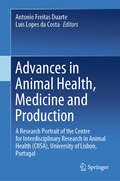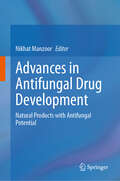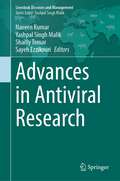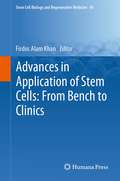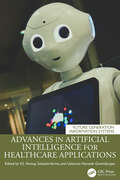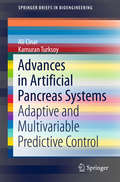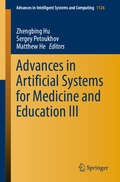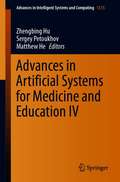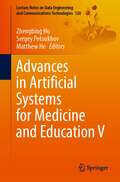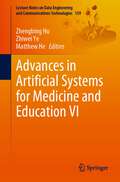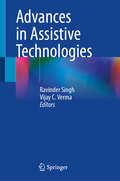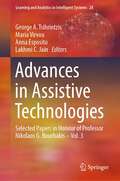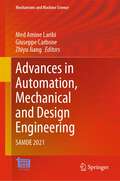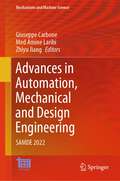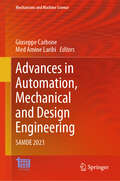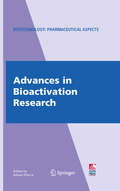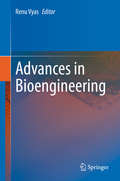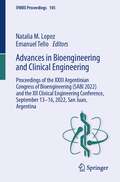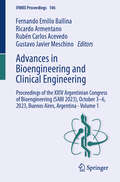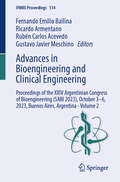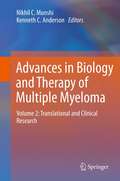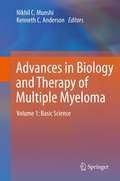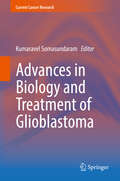- Table View
- List View
Advances in Animal Health, Medicine and Production: A Research Portrait of the Centre for Interdisciplinary Research in Animal Health (CIISA), University of Lisbon, Portugal
by Antonio Freitas Duarte Luís Lopes da CostaThis book brings together in a review manner a comprehensive summary of high-quality research contributions from the different research teams and their collaborators, to celebrate the 25th anniversary of the Centre for Interdisciplinary Research in Animal Health (CIISA). The topics span from animal behaviour and welfare over biotechnology to clinical veterinary medicine. Thus, the book is of interest for researchers and students working in the diverse fields of veterinary medicine and science.The Centre for Interdisciplinary Research in Animal Health (CIISA), the Research Centre of the Faculty of Veterinary Medicine of the University of Lisbon, commemorated its 25th-year jubilee in 2018. Throughout its history, CIISA has been consolidating as the top-ranking Portuguese Animal and Veterinary Sciences research unit.More recently, CIISA has taken a leading role in the coordination of national and international research networks and consortiums. This conveyed a highly interdisciplinary nature to CIISA’s research, encompassing animal, veterinary and biomedical sciences. This multi- and interdisciplinary nature is reflected on the broad scientific background of the team.
Advances in Antifungal Drug Development: Natural Products with Antifungal Potential
by Nikhat ManzoorThis book explores the antifungal properties of natural products and reviews their antifungal mechanism. An introductory chapter illustrates the various fungal pathogenic species, common fungal diseases, and general mechanisms of action of various antifungal classes, including natural products. The book comprises seven sections and each section contains chapters on the efficacy and antifungal mode of action of plant extracts, essential oils, natural compounds, their derivatives, and plant-based nanoparticles. A section summarizes the antifungal efficacy of compounds derived from sources other than plants, like microbes. Besides compound toxicity, the book explores the antifungal mode of action and efficacy against the virulence and pathogenicity of fungal pathogens like Candida, Aspergillus, Cryptococcus, Histoplasma, and other pathogenic fungi. Further, the book also describes recent advancements in the discovery of novel drug targets and therapeutic strategies that are non-toxic and more efficacious for combating drug resistance. This book is an invaluable source for researchers working in the field of fungal biochemistry, anti-microbial, and anti-bacterial and undergraduate and postgraduate students of microbiology and pharmacology.
Advances in Antiviral Research (Livestock Diseases and Management)
by Naveen Kumar Yashpal Singh Malik Shailly Tomar Sayeh EzzikouriThis book illustrates advancements in the sophisticated tools and techniques for discovering and designing new antiviral drugs, identifying approved drugs against new and emerging viruses through large-scale computational virtual screening or drug repurposing approaches, and their evaluation in various in vitro and in vivo models. The chapters also cover the challenges associated with the emergence of antiviral drug resistance and possible ways to counter them. It discusses bioinformatics tools and software and computational approaches for the discovery of antivirals. The books also outline approaches for designing broad-spectrum antivirals effective against viruses by epigenetic- and epitranscriptomic-targeted reprogramming. Further, it provides vital details on the procedures for drug applications, clinical trials, and their regulations. Finally, the book provides a comprehensive yet representative description of advances in antiviral research protocols and methodologies suitablefor antiviral researchers at all career stages, including graduate and postgraduate students and policy-makers.
Advances in Application of Stem Cells: From Bench to Clinics (Stem Cell Biology and Regenerative Medicine #69)
by Firdos Alam KhanThe field of stem cell biology is expanding with a continued surge of new information related to its applications. Over past few years, stem cells have been extensively used in cell therapy, tissue engineering, in vitro drug testing among others. At the moment there is no single book available which comprehensively describes the significance of various application of stem cells derived from embryonic and adult sources from lab to clinics. In this edited volume, we discuss basics and advanced topics of stem cells to help researchers, students and professional find the most important information in a single source of updated information about stem cells and relevant applications. This book is divided in 12 chapters and covers topics such as in vitro cell culture, 3D cell culture, cell therapy, tissue engineering, cell factory, cell functionality, in vitro drug testing, organ development, autologous transplantation, allogeneic transplantation, adult stem cells, multipotent stem cells, induced pluripotent stem cells, a pluripotent and embryonic stem cells.
Advances in Artificial Intelligence for Healthcare Applications (Future Generation Information Systems)
by V. S. Anoop Suhasini Verma Usharani Hareesh GovindarajanAdvances in Artificial Intelligence for Healthcare Applications comprehensively covers the theoretical foundations, applications, and research potential of artificial intelligence in the healthcare domain.Features: Discusses advanced concepts such as biomedical large language models, and natural language processing applications Covers machine vision applications for robotics in healthcare, challenges, and trends in rehabilitation devices in healthcare, and robotic interactions and control for wearable devices Presents the Internet of Things-based disease monitoring systems, Internet of nano-things for healthcare applications, and wearable Medical Internet of Things devices for accessible healthcare services Explains the use of artificial intelligence in bone and brain imaging, molecular imaging using artificial intelligence, and medical image segmentation Illustrates the importance of using generative artificial intelligence for clinical documentation, and medical imaging applications using generative artificial intelligence The text is primarily written for senior undergraduates, graduate students, and academic researchers in the fields of electrical engineering, electronics and communications engineering, computer science and engineering, and biomedical engineering.
Advances in Artificial Pancreas Systems: Adaptive And Multivariable Predictive Control (Springerbriefs In Bioengineering Series)
by Ali Cinar Kamuran TurksoyThis brief introduces recursive modeling techniques that take account of variations in blood glucose concentration within and between individuals. It describes their use in developing multivariable models in early-warning systems for hypo- and hyperglycemia; these models are more accurate than those solely reliant on glucose and insulin concentrations because they can accommodate other relevant influences like physical activity, stress and sleep. <P><P> Such factors also contribute to the accuracy of the adaptive control systems present in the artificial pancreas which is the focus of the brief, as their presence is indicated before they have an apparent effect on the glucose concentration and so can be more easily compensated. The adaptive controller is based on generalized predictive control techniques and also includes rules for changing controller parameters or structure based on the values of physiological variables. Simulation studies and clinical studies are reported to illustrate the performance of the techniques presented.
Advances in Artificial Systems for Medicine and Education III (Advances in Intelligent Systems and Computing #1126)
by Sergey Petoukhov Matthew He Zhengbing HuThis book discusses the latest advances in the development of artificial intelligence systems and their applications in various fields, from medicine and technology to education. It comprises papers presented at the Third International Conference of Artificial Intelligence, Medical Engineering, Education (AIMEE2019), held at the Mechanical Engineering Institute of the Russian Academy of Sciences, Moscow, Russia, on 1–3 October 2019. Covering topics such as mathematics and biomathematics; medical approaches; and technological and educational approaches, it is intended for the growing number of specialists and students in this field, as well as other readers interested in discovering where artificial intelligence systems can be applied in the future.
Advances in Artificial Systems for Medicine and Education IV (Advances in Intelligent Systems and Computing #1315)
by Sergey Petoukhov Matthew He Zhengbing HuThis book covers the latest advances for the development of artificial intelligence systems and their applications in various fields from medicine and technology to education. The proceedings comprise refereed papers presented at the Fourth International Conference of Artificial Intelligence, Medical Engineering, Education (AIMEE2020), held at the Mechanical Engineering Institute of the Russian Academy of Sciences, Moscow, Russia, in 3–4 October 2020. Given the rapid development of artificial intelligence systems, the book emphasizes the need for the intensification of training of a growing number of relevant specialists, in particular, in medical engineering to increase the effectiveness of medical diagnosing and treatment. In digital artificial intelligence systems, scientists endeavor to reproduce the innate intellectual abilities of human and other organisms, and the in-depth study of genetic systems and inherited biological processes can provide new approaches to create more and more effective artificial intelligence methods. Topics of the included papers concern thematic materials in the following spheres: mathematics and biomathematics; medical approaches; technological and educational approaches. The book is a compilation of state-of-the-art papers in the field, covering a comprehensive range of subjects that is relevant to business managers and engineering professionals alike. The breadth and depth of these proceedings make them an excellent resource for asset management practitioners, researchers, and academics, as well as undergraduate and postgraduate students interested in artificial intelligence and bioinformatics systems as well as their growing applications. Intended readership includes specialists, students, and other circles of readers who would like to know where artificial intelligence systems can be applied in the future with great benefit.
Advances in Artificial Systems for Medicine and Education V (Lecture Notes on Data Engineering and Communications Technologies #107)
by Sergey Petoukhov Matthew He Zhengbing HuThis book broadly covers a scope of the latest advances for the development of artificial intelligence systems and their applications in various fields from medicine and technology to education. The proceedings comprise refereed papers presented at the Fifth International Conference of Artificial Intelligence, Medical Engineering, and Education (AIMEE2021), which took place at the Mechanical Engineering Institute of the Russian Academy of Sciences, Moscow, Russia, on 1–3 October 2021. Given the rapid development of artificial intelligence systems, the book emphasizes the need for the intensification of training of a growing number of relevant specialists, in particular, in medical engineering to increase the effectiveness of medical diagnosing and treatment. In digital artificial intelligence systems, scientists endeavour to reproduce the innate intellectual abilities of humans and other organisms, and the in-depth study of genetic systems and inherited biological processes can provide new approaches to create more and more effective artificial intelligence methods. Topics of the included papers concern thematic materials in the following spheres: mathematics and biomathematics; medical approaches; technological and educational approaches. The book is a compilation of cutting-edge research papers in the field, covering a comprehensive range of subjects that are relevant to business managers and engineering professionals alike. The breadth and depth of these proceedings make them an excellent resource for asset management practitioners, researchers, and academics, as well as undergraduate and postgraduate students who are interested in artificial intelligence, bioinformatics systems, also their expanding applications. The intended readership includes specialists, students, and other circles of readers who would like to know where artificial intelligence systems can be applied in the future with great benefit.
Advances in Artificial Systems for Medicine and Education VI (Lecture Notes on Data Engineering and Communications Technologies #159)
by Matthew He Zhengbing Hu Zhiwei YeThe book provides a thorough overview of recent developments in the design of AI systems and their uses in a range of industries, including education, technology, and bioinformatics. The papers in the proceedings were presented at the Sixth International Conference on Artificial Intelligence, Medical Engineering, and Education (AIMEE2022), which took place in Wuhan, China, from August 19 to 21, 2022. The book underlines the need for the intensification of training of an increasing number of appropriate specialists given the rapid growth of AI systems. In order to replicate human and other species' natural intelligence in digital AI systems, the researchers have been studying genetics and inherited biological processes in-depth. These studies offer fresh ideas for developing ever more powerful AI techniques. The featured articles cover a variety of themes in the fields of mathematics and biomathematics, medical approaches, technical and educational approaches, and medical approaches. The book is a compilation of recent academic papers in the discipline, covering a wide range of topics that are important to both business managers and engineers. This proceedings is a fantastic resource for asset management practitioners, researchers, and academics, as well as undergraduate and graduate students who are interested in AI, bioinformatics systems, and their developing applications. This is due to the breadth and depth of the proceedings. Experts, students, and other people who are interested in learning about how AI systems might be used in the future are the target audience.
Advances in Assistive Technologies
by Vijay C. Verma Ravinder SinghThis book covers different aspects of assistive technologies. It sets up the plan for clarifying the definition and the precise role of assistive technologies in other disabilities and functional impairments. It expands the scope of assistive technologies from disabilities to functional impairments caused due to old age, various injuries, chronic diseases, neurodevelopmental disorders, and mental health conditions. Its comprehensive literature review describes current and emerging devices and presents evidence-based guidelines for matching promising technologies to individuals. Program outcomes are assessed, as are their potential impact on the future of the field. It also covers social, educational, training, manufacturing, and policy-making aspects of assistive technologies. It also describes assistive technologies based on the 5Ps, i.e., people, policy, products, provision, and personnel. It also elaborates on the assistive technologies on the aspects of awareness, availability, accessibility, affordability, acceptability, adaptability, quality, and use. It is a valuable read for therapists, medical professionals, trainees, students of allied health systems, public health specialists, policymakers, and assistive technology manufacturers.
Advances in Assistive Technologies: Selected Papers in Honour of Professor Nikolaos G. Bourbakis – Vol. 3 (Learning and Analytics in Intelligent Systems #28)
by Lakhmi C. Jain Maria Virvou George A. Tsihrintzis Anna EspositoThis book aims at exposing its readers to some of the most significant advances in assistive technologies. Assistive technologies develop devices to assist vulnerable people, including elderly people, people with cognitive disabilities such as memory problems or dementia, and people with functional disabilities such as those needing support in toileting, moving around, eating, bathing, dressing, grooming, and taking personal care. The ever-increasing life expectancy and world population, along with the emergence of new diseases and the regrettable continuation of armed conflicts, press for development and availability of assistive technologies that offer people in need the opportunity to live secure and controlled lives with more active participation in society and at a reduced assistive cost. This task can be accomplished only with more advanced devices than traditional-powered wheelchairs or eating/drinking devices, including prosthetics, exoskeletons, visual and hearing aids, cognitive aids, and devices enhanced with artificial intelligence.The book consists of an editorial note and an additional twelve (12) chapters, all of which have been written by authors who work on the corresponding chapter theme and are recognized for their significant research contributions. In more detail, the chapters in the book are organized into four parts, namely (i) Advances in Assistive Technologies in Healthcare, (ii) Advances in Assistive Technologies in Medical Diagnosis, (iii) Advances in Assistive Technologies in Mobility and Navigation, and (iv) Advances in Privacy and Explainability in Assistive Technologies.This research book is directed towards professors, researchers, scientists, engineers, and students in assistive technologies. It is also directed towards readers who come from other disciplines and is interested in becoming versed in some of the most recent assistive technologies. An extensive list of bibliographic references at the end of each chapter guides its readers to probe further into the application areas of interest to them.
Advances in Asthma: Pathophysiology, Diagnosis And Treatment (Respiratory Disease Series: Diagnostic Tools And Disease Managements Ser.)
by Akihito YokoyamaThis book provides discussions on bronchial asthma from a clinical perspective, focusing on the recent studies on its pathophysiology, diagnosis and treatment. It also explores the lastest findings regarding the phenotypes and endotypes of asthmatic patients, making it of particular interest to those involved with non-eosinophilic asthma and eosinophilic asthma. Further, it discusses the importance of ILC 2 in eosinophilic asthma, and the accumulated results from the forced oscilliation technique and periostin that are actively practiced in Japan. As some aspects of diagnosis and treatment are different in Western and Asian countries, it is important that the data is disseminated around the globe. The clinical questions addressed by the authors are critical and thought provoking, while the questions raised by the editors are instructive, informative and provide new perspectives on unresolved issues. This book appeals to wide readership from beginning learners to physicians in clinical practice and scholars engaging in basic research.
Advances in Automation, Mechanical and Design Engineering: SAMDE 2021 (Mechanisms and Machine Science #121)
by Giuseppe Carbone Med Amine Laribi Zhiyu JiangThis book presents the proceedings of the 2021 International Symposium on Automation, Mechanical and Design Engineering (SAMDE), held in Beijing, China, on 3–5 December 2021, and organized by the Hong Kong Society of Robotics and Automation (HKSRA). It gathers contributions by researchers from several countries on the following topics: digitalized development and use of sustainable products and manufacturing systems, artificial intelligence, automated reasoning, human-robot collaborative interaction, sensors and autonomous sensor systems, cyber-physical control systems, generative design including topology optimization, advanced simulation and modelling, intelligent automation, smart materials, materials processing and factories, and circular economy, etc. The book offers a source of information and inspiration for researchers seeking to improve their work and gather new ideas for future developments.
Advances in Automation, Mechanical and Design Engineering: SAMDE 2022 (Mechanisms and Machine Science #138)
by Giuseppe Carbone Med Amine Laribi Zhiyu JiangThis book presents the proceedings of the 2022 3rd International Symposium on Automation, Mechanical and Design Engineering (SAMDE), held in Beijing, China, on December 16–18, 2022, and organized by the Hong Kong Society of Robotics and Automation (HKSRA). It gathers contributions by researchers from several countries on the following topics: digitalized development and use of sustainable products and manufacturing systems, artificial intelligence, automated reasoning, human–robot collaborative interaction, sensors and autonomous sensor systems, cyber-physical control systems, generative design including topology optimization, advanced simulation and modelling, intelligent automation, smart materials, materials processing and factories, and circular economy, etc. The book offers a source of information and inspiration for researchers seeking to improve their work and gather new ideas for future developments.
Advances in Automation, Mechanical and Design Engineering: SAMDE 2023 (Mechanisms and Machine Science #161)
by Giuseppe Carbone Med Amine LaribiThis book presents the proceedings of the 2023 4th International Symposium on Automation, Mechanical and Design Engineering (SAMDE), held in Nanjing, China, on December 8–10, 2023. It gathers contributions by researchers from several countries on the following topics: digitalized development and use of sustainable products and manufacturing systems, artificial intelligence, automated reasoning, human–robot collaborative interaction, sensors and autonomous sensor systems, cyber-physical control systems, generative design including topology optimization, advanced simulation and modelling, intelligent automation, smart materials, materials processing and factories, and circular economy, etc. The book offers a source of information and inspiration for researchers seeking to improve their work and gather new ideas for future developments.
Advances in Bioactivation Research (Biotechnology: Pharmaceutical Aspects #IX)
by Adnan ElfarraThis volume provides researchers with recent information on bioactivation reactions of drugs and toxicants. It also provides examples of how molecular and genomic biology, proteomics, mass spectrometry, and computational modeling are used in bioactivation research. In other sections, focus is on recent applications of bioactivation research in pharmacology, toxicology, and environmental health sciences, where contributors demonstrate the integration of bioactivation research.
Advances in Bioengineering
by Renu VyasThis book provides a single source of information on three major bioengineering areas: engineering at the cellular and molecular level; biomedical devices / instrument engineering; and data engineering. It explores the latest strategies that are essential to advancing our understanding of the mechanisms of human diseases, the development of new enzyme-based technologies, diagnostics, prosthetics, high-performance computing platforms for managing huge amounts of biological data, and the use of deep learning methods to create predictive models. The book also highlights the growing importance of integrating chemistry into life sciences research, most notably concerning the development and evaluation of nanomaterials and nanoparticles and their interactions with biological material. The underlying interdisciplinary theme of bioengineering is addressed in a range of multifaceted applications and worked out examples provided in each chapter.
Advances in Bioengineering and Clinical Engineering: Proceedings of the XXIII Argentinian Congress of Bioengineering (SABI 2022) and the XII Clinical Engineering Conference, September 13–16, 2022, San Juan, Argentina (IFMBE Proceedings #105)
by Natalia M. Lopez Emanuel TelloThis book offers a timely snapshot of research, technologies and best practices in the broad area of bioengineering and clinical engineering. Contributions report on advances in biomechanics, biomaterials, and tissue engineering, biosensors and instrumentation, biomedical signal processing, and rehabilitation engineering. Further, it covers topics relating to quality engineering and management of health services, and of engineering education. The book gathers selected, peer-reviewed contributions to the XXIII Argentinian Congress of Bioengineering and the XII Clinical Engineering Conference, both known under the acronym “SABI 2022”, held on September 13–16, 2022, in San Juan, Argentina, and organized by the Sociedad Argentina de Bioingeniería.
Advances in Bioengineering and Clinical Engineering: Proceedings of the XXIV Argentinian Congress of Bioengineering (SABI 2023), October 3–6, 2023, Buenos Aires, Argentina - Volume 1 (IFMBE Proceedings #106)
by Ricardo Armentano Fernando Emilio Ballina Rubén Carlos Acevedo Gustavo Javier MeschinoThis book offers a timely snapshot of research, technologies and best practices in the broad area of bioengineering and clinical engineering. It reports on advances in biomechanics, biomedical image processing, biomaterials and tissue engineering. Further, it covers applications of artificial intelligence in biology and medicine, and instrumentation. Gathering the first volume of the proceedings of the XXIV Argentinian Congress of Bioengineering (SABI 2023), held on October 3–6, 2023, in Buenos Aires, Argentina - and organised by the Sociedad Argentina de Bioingeniería, this book provides an extensive source of information for both researchers and professionals in biomedical and clinical engineering.
Advances in Bioengineering and Clinical Engineering: Proceedings of the XXIV Argentinian Congress of Bioengineering (SABI 2023), October 3–6, 2023, Buenos Aires, Argentina - Volume 2 (IFMBE Proceedings #114)
by Ricardo Armentano Fernando Emilio Ballina Rubén Carlos Acevedo Gustavo Javier MeschinoThis book offers a timely snapshot of research, technologies and best practices in the broad area of bioengineering and clinical engineering. Contributions report on advances in biomedical signal processing, biosystem models and 3D printing applications, clinical engineering, and neuromuscolar system analysis and rehabilitation engineering. They also cover developments in bioengineering education. Gathering the second volume of the proceedings of the XXIV Argentinian Congress of Bioengineering (SABI 2023), held on October 3–6, 2023, in Buenos Aires, Argentina - and organised by the Sociedad Argentina de Bioingeniería, this book provides an extensive source of information for both researchers and professionals in biomedical and clinical engineering.
Advances in Biology and Therapy of Multiple Myeloma, Volume 2: Volume 2: Translational and Clinical Research
by Nikhil C. Munshi Kenneth C. AndersonDespite the advances in conventional, novel agent and high dose chemotherapy multiple myeloma (MM) remains incurable. In order to overcome resistance to current therapies and improve patient outcome, novel biologically-based treatment approaches are being developed. Current translational research in MM focusing on the development of molecularly-based combination therapies has great promise to achieve high frequency and durable responses in the majority of patients. Two major advances are making this goal possible. First, recent advances in genomics and proteomics in MM have allowed for increased understanding of disease pathogenesis, identified novel therapeutic targets, allowed for molecular classification, and provided the scientific rationale for combining targeted therapies to increase tumor cell cytotoxicity and abrogate drug resistance. Second, there is now an increased understanding of how adhesion of MM cells in bone marrow (BM) further impacts gene expression in MM cells, as well as in BM stromal cells (BMSCs). As a result of these advances in oncogenomics on the one hand and increased understanding of the role of the BM in the pathogenesis of MM on the other, a new treatment paradigm targeting the tumor cell and its BM microenvironment to overcome drug resistance and improve patient outcome has now been developed. Thalidomide, lenalidomide, and Bortezomib are three agents which target the tumor cell in its microenvironment in both laboratory and animal models and which have rapidly translated from the bench to the bedside. Ongoing efforts are using oncogenomics and cell signaling studies to identify next generation of therapies in MM on the one hand, and to inform the design of combination trials on the other. This new paradigm for overcoming drug resistance and improving patient outcome in MM has great promise not only to change the natural history of MM, but also to serve as a model for targeted therapeutics directed to improve outcome of patients with MM.
Advances in Biology and Therapy of Multiple Myeloma: Volume 1: Basic Science
by Nikhil C. Munshi Kenneth C. AndersonDespite the advances in conventional, novel agent and high dose chemotherapy multiple myeloma (MM) remains incurable. In order to overcome resistance to current therapies and improve patient outcome, novel biologically-based treatment approaches are being developed. Current translational research in MM focusing on the development of molecularly-based combination therapies has great promise to achieve high frequency and durable responses in the majority of patients. Two major advances are making this goal possible. First, recent advances in genomics and proteomics in MM have allowed for increased understanding of disease pathogenesis, identified novel therapeutic targets, allowed for molecular classification, and provided the scientific rationale for combining targeted therapies to increase tumor cell cytotoxicity and abrogate drug resistance. Second, there is now an increased understanding of how adhesion of MM cells in bone marrow (BM) further impacts gene expression in MM cells, as well as in BM stromal cells (BMSCs). As a result of these advances in oncogenomics on the one hand and increased understanding of the role of the BM in the pathogenesis of MM on the other, a new treatment paradigm targeting the tumor cell and its BM microenvironment to overcome drug resistance and improve patient outcome has now been developed. Thalidomide, lenalidomide, and Bortezomib are three agents which target the tumor cell in its microenvironment in both laboratory and animal models and which have rapidly translated from the bench to the bedside. Ongoing efforts are using oncogenomics and cell signaling studies to identify next generation of therapies in MM on the one hand, and to inform the design of combination trials on the other. This new paradigm for overcoming drug resistance and improving patient outcome in MM has great promise not only to change the natural history of MM, but also to serve as a model for targeted therapeutics directed to improve outcome of patients with MM.
Advances in Biology and Treatment of Glioblastoma (Current Cancer Research)
by Kumaravel SomasundaramThis volume covers the most important areas of glioblastoma - surgical resection, molecular pathology, targeted therapies, cancer stem cells, the role of DNA methylation, targeted sequencing for personalized therapy, animal models and advances in pediatric glioblastoma. Chapter authors are junior and senior investigators, who are well established in their particular areas and include neurosurgeons, neuropathologists, neurooncologists and basic scientists.
Advances in Biomaterials
by Stuart M. LeeThis book discusses advanced instrumental techniques for the rapid bioassay of toxic materials, creep analysis of Delrin stents in cardiac bioprosthesis devices using finite element analysis, and the potential use of electron spectroscopy for chemical analysis for study of biomaterial surface.
